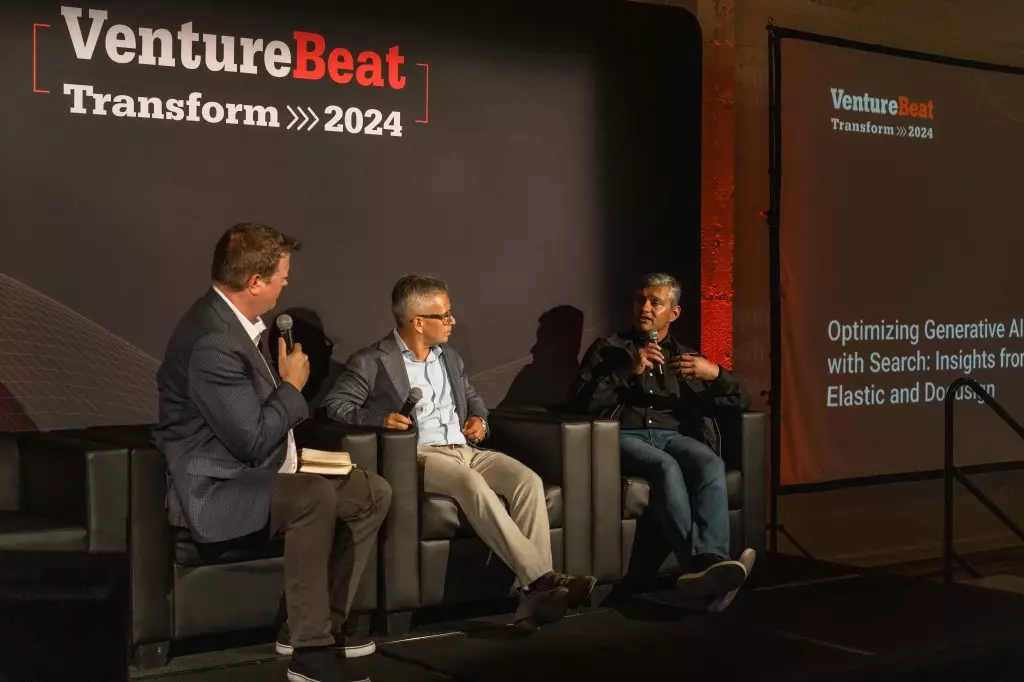In a recent discussion at VentureBeat’s Transform 2024 event, Elastic CEO Ash Kulkarni and DocuSign CPO Dmitri Krakovsky shed light on the impact of generative AI on enterprise search and contract management. This conversation highlighted the increasing significance of AI-powered search tools for businesses dealing with large volumes of data and intricate contractual relationships. Elastic has made significant strides in its enterprise search approach by incorporating generative AI. The introduction of the Elasticsearch Relevance Engine (ESRE) in May 2023 marked a pivotal shift in the company’s search technology strategy. ESRE merges traditional keyword-based search methods with advanced vector search capabilities, enabling a deeper understanding of context and semantics within extensive data repositories. This hybrid approach provides Elastic’s customers with more sophisticated ways to retrieve relevant documents from their Elasticsearch stores, whether through vector search, text search using BM25, or a combination of techniques.
Kulkarni highlighted Elastic’s progress in integrating retrieval augmented generation (RAG) into its vector database technology. This enhancement enables the database to benefit from the work done in Elasticsearch over the years. The comprehensive capabilities now available include permissions, faceted search, hybrid search, redirecting, and the ability to utilize multiple search techniques such as BM25 basic search and vector search. Elastic’s commitment to flexibility and developer choice is evident in Kulkarni’s emphasis on providing developers with a range of functionalities and model options to choose from. This approach aligns with the company’s ethos of openness and adaptability.
DocuSign is leveraging AI to revolutionize contract management processes. Krakovsky outlined the company’s vision of using AI agents to assist in negotiating contracts, hinting at a future where AI actively participates in contract negotiations. The Intelligent Agreement Management (IAM) platform aims to convert static contract data into actionable insights. The core components of IAM – Maestro, Navigator, and App Center – collaborate to analyze contracts and address the challenge of digitizing complex contractual relationships. By transforming static PDFs into structured, analyzable data, IAM enables organizations to gain valuable insights and identify cost-saving opportunities within their contract portfolio.
Both executives emphasized the importance of responsible AI adoption, particularly when dealing with sensitive data like contracts. Krakovsky stressed the need to move quickly but cautiously, ensuring that all implications of AI adoption are carefully considered. DocuSign prioritizes data security and transparency by seeking explicit permission when using customer data for training purposes. Delivering end-to-end solutions, rather than fragmented offerings, is a cornerstone of their approach. By addressing the entire problem landscape, DocuSign aims to provide holistic solutions that streamline contract management processes for their clients.
Cost optimization has emerged as a critical factor in AI adoption, with efficient resource utilization becoming essential for sustainable AI scaling. By optimizing resource consumption and leveraging advancements in hardware technology, organizations can maximize the value derived from AI implementations. Kulkarni predicts a downward trend in the cost of inference, driven by improvements in chipsets and increased competition in the field of large language models. Efficient resource management and cost-effective scaling strategies are vital for companies handling massive data volumes and seeking to expand their AI capabilities.
Looking ahead, both executives discussed the expanding capabilities of AI and its potential applications in various industries. Kulkarni highlighted the emergence of multimodal AI models, which can handle diverse data types and deliver contextually relevant responses across different modalities. Krakovsky outlined specific applications of AI in contract management, emphasizing the ability to extract insights, identify compliance issues, and automate processes to improve efficiency. Real-world examples showcased how AI-powered search tools are transforming client interactions in industries like finance, enabling more personalized and informed engagement with customers.
From enhancing search capabilities to automating contract management processes, the potential applications of AI in business are vast. However, realizing this potential requires organizations to navigate through technical, ethical, and operational challenges. Issues related to data privacy, model transparency, and cost-effective scaling remain at the forefront of AI discussions. As AI continues to evolve and permeate various aspects of enterprise operations, finding a balance between innovation and responsibility will be crucial for driving sustainable growth and success.


Leave a Reply